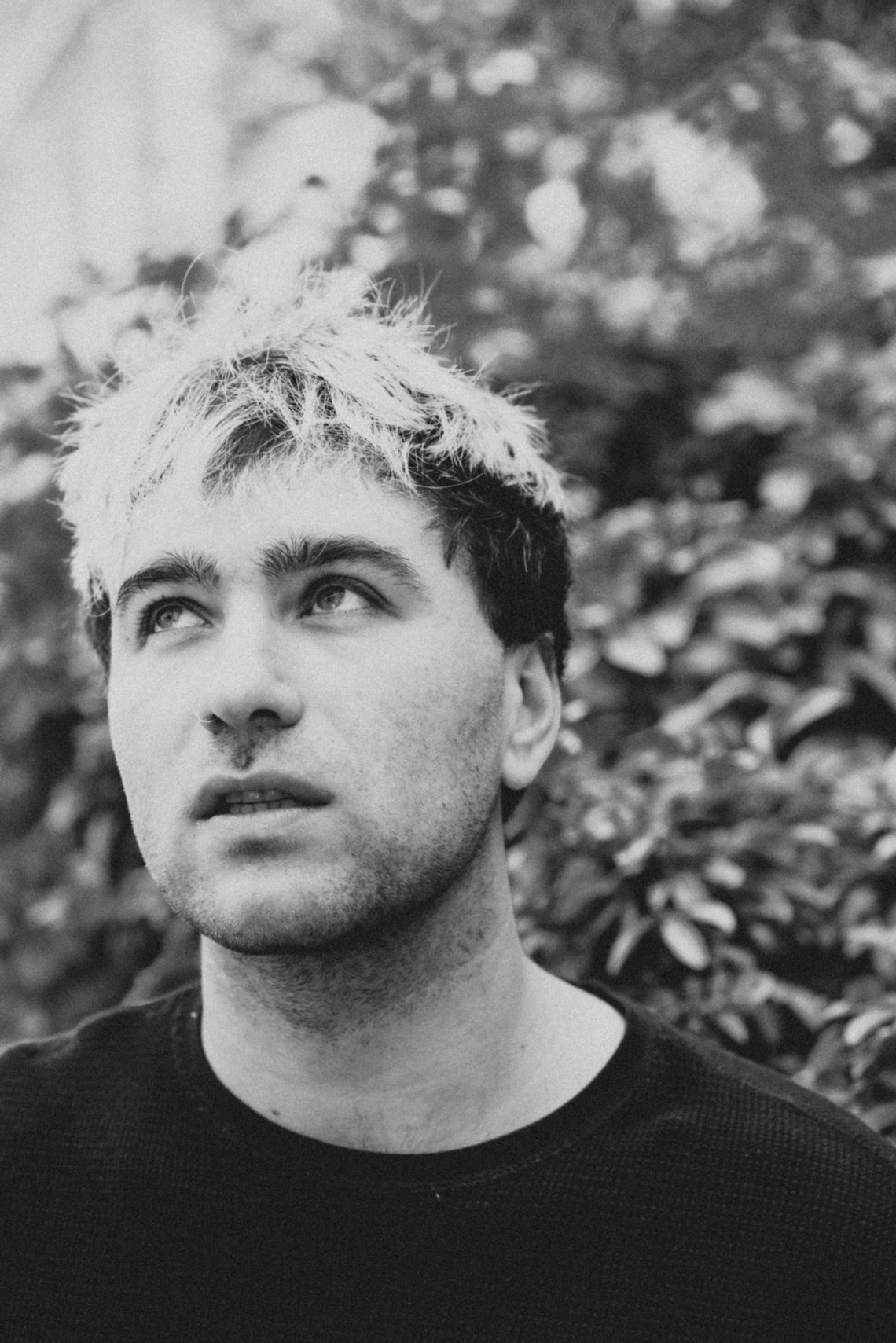Simplicity reigns supreme for Tim Ostrowsky-Thomas, better known as the mind behind Morning Crush. “There is a sense of honesty to the music that I’m into,” he says. “It’s about the story, it’s about the lyrics, it’s about the melody. I don’t have 50 different guitar pedals. I want the bare bones of the song to sound great.” He strives to emulate the artists that inspire him. “I try to sound like the songs I want to hear. I think, ‘Oh, I really want to write songs like Neil Young writes songs, or like Bob Dylan writes songs.’ That’s sort of how it’s always been. And my music is impacted by whatever’s going on in my personal life or my personal identity or who I think I am. Which also isn’t something I try to think too much about.”
An ADHD diagnosis meant Tim could no longer avoid self-introspection. First, he had to confront his own biases. “I didn’t even really know it was anything to be taken seriously, to be honest. I thought ADHD was basically just a personality trait. I was quite ignorant about the whole thing. I didn’t really understand it, partly due to misinformation. People do talk about it in such a casual way, don’t they? Like, ‘Oh, I’m a bit ADHD.’ Someone told me I might have it. I went to research it online and I was like, ‘Oh my God, I’ve never related to something more.” The diagnosis provided the relief of a framework for the jumbled jigsaw of his mental health. “I’ve always been diagnosed with mood disorders. I’ve had depressive disorder, anxiety, borderline personality disorder, and OCD, but none of them really got to the root of the problem or made much sense. They all just seemed to intertwine. The headline was, ‘You are just a mess,’ but we didn’t know why. When I got the ADHD diagnosis, we found out that these mood disorders were like trees, and the root was ADHD. I’m not a neuroscientist. I’m not a doctor, but it is so much more than just, ‘Oh look, there’s a squirrel.’ It really is debilitating and it is a disability in a way that a lot of people don’t think it is. It’s very much controlled my whole life.”
Proper care allowed him a previously unimaginable sense of freedom. “When I got diagnosed and treated and started taking ADHD medication, I felt like I’d started living for the first time in my life,” Tim confesses. “I could do the dishes, I could brush my teeth, I could do the most basic tasks that I didn’t do most of the time before. It was really bad. I’m really jealous of people who get diagnosed when they’re young because it took me all of my adult life to get diagnosed. There’s a lot to it. My music’s better now. I’m writing more songs more regularly. I can focus more than ever since I’ve learned to understand myself.” In spite of his flourishing, he still struggles with feelings of not being disabled enough for his new community. Ableism affects everyone with a disability, whether it’s visible or invisible. “I get a lot of imposter syndrome saying I have a disability when I’ve got a close friend who does have a physical disability. They’ve made a point of never accepting any help and that’s great. I’m so proud of them, but it makes me feel like an imposter to say that I have a disability because it’s invisible. It makes me feel like it can’t be that bad for me. And I say that to myself and I beat myself up and tell myself I’m just lazy. It’s very nuanced and I feel somewhat guilty.” Tim is drained by the constant scrutiny and attempts to invalidate his disability. Compassion is sorely lacking. “Trying to educate or confront people is exhausting. People just look for reasons why you don’t need help and talk about people who fake it, but there are plenty more people who actually need help.” The appropriate response is to uplift and encourage everyone with any disability whenever possible. “We have to be kinder and more accepting. We have to give everyone the support that they need and that they say they need. And we need to believe in people’s own experiences.”
Tim’s new EP, Tidal Wave, reflects a man on the precipice of great change. “It’s a brief snapshot, a moment in my life. It’s like a diary entry. One of my best friends had suddenly died and I was dealing with the grief from that. I’d just ended a really toxic relationship that I was in and began a new healthy relationship. I still had undiagnosed neurodiversion and was trying to understand all these mood disorders that I’ve been diagnosed with before I knew I had ADHD. Each song is about one of those events.” He had the opportunity to work with childhood idol turned collaborator, Frank Turner. “He’s a really nice dude and I feel really comfortable working with him. What’s funny is when I’m working with him, there’s always a voice in my head that creeps in saying, ‘That’s Frank Turner. That’s one of your favorite songwriters. That’s the guy whose songs you used to obsessively learn when you were 16.’ As a producer, he is perfect. He’s perfect for me. I wouldn’t say our stuff is identical. It’s different in a lot of ways, but there’s obvious influence there. Some of the songs on that EP, he just really got in a way that not a lot of producers would.” Frank is a bona fide musical alchemist. “We have a song called ‘Manhattan’ on that EP and I think it’s one of our strongest songs now. It’s released as a single. That’s largely down to Frank’s production. It started off as a soft, Leonard Cohen inspired acoustic song and he turned it into a foot stomping folk rock song. It was amazing to work with him and he expanded the songs and the meanings of the songs for me in a way that I didn’t even know existed.” Tim has found his ideal professional partner. “I just instinctively trust his ideas. A lot of the time I work with producers and I’ll be like, ‘Hmm, I dunno, let me hear it. Oh, I’m not sure. Is that gonna work?’ When you’re giving your song to someone else to work with, there’s always that voice a little bit. But after what he did to ‘Manhattan,’ I was like, ‘Mate, whatever you think, I totally trust you. Cause you’re clearly better at this than I am.’ It’s almost like he knows how to put together a good folk rock song because it’s been his job for most of his adult life. I just totally trust the ideas that he comes up with. It’s really nice and really comforting.”
By far, the most personal song on the EP is “Two Ghosts,” a poignant letter to his dearly departed friend. Grief initially sent Tim into a self-destructive numbness. “My friend Marco dropped dead suddenly of a heart attack. It came out of nowhere and I spent that first month in bed, eating crap, drinking, smoking various things, and just not treating myself very well. And then I had this very unhealthy ‘snap out of it’ moment where I was like, ‘Right, life goes on, let’s crack on.’ I started pushing it down and I went to work and I did my thing.” He decided to process his loss at last when COVID forced him to quarantine. “I realized that it had been a year since the day he died. And I was like, ‘Oh God, I really haven’t dealt with this, have I?’ I was isolating, but I wasn’t actually ill, so I wrote ‘Two Ghosts,’ which is written a year after he died about everything he’d missed.” The track was a loving salve for a gaping wound. “I finally dealt with the emotions properly. I definitely have a sense of toxic masculinity. I don’t know if that’s the right term, but I find it very hard to cry. When I finished that song, I really did cry quite a lot and that was really healthy for me. Accepting the fact that he’s gone, he’s never coming back and dealing with that grief properly, which is something I’d never learned. He was a real character. I would’ve loved to have heard what he would say about the Capitol being stormed. He was a Scottish guy. I would’ve loved for him to have seen England get kicked out of the Euro Cup. That song was about sending him a little letter saying, ‘Here’s some of the things that you missed. I’d love to talk to you about them, but I can’t.’”
Tim’s goal for Tidal Wave is quite simple. “I really just hope people like it. I can’t wait to get the next EP out as well. Putting music out there is my favorite thing to do. So I just hope people like it. That’s really all I can honestly say.” Life washes over us, but the memories will stay. Tidal Wave will be released on Bandcamp on June 16 and will be available for streaming on all platforms June 23.
Read more Music Interviews at ClicheMag.com
Morning Crush Comes to Terms with Change and Neurodivergence. Photo Credit: Kiki.




